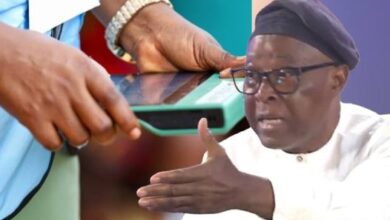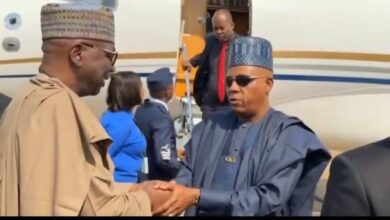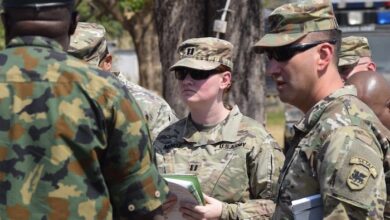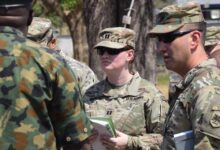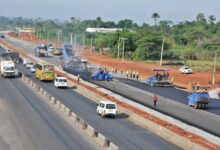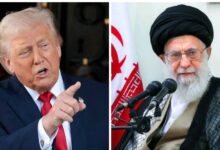Fuel Scarcity: The marketers, NNPC and citizens’ angle (Part I), by Bashir Adefaka

Part of the causes of this citizenship disorderliness is the wicked, unpatriotic behaviours towards socio-economy and, largely, security on the part of these oil marketers, who even take fuel supply from depot in Nigeria only to either hoard from normal market and sell to black marketers or divert to neighbouring countries, e.g. Benin Republic. Their personal gains become their priority even when it runs foul of national interest. In Lagos Island, there are two particular filling stations named Conoil; in their own nature, at difficult times like this, they only sell their content to no more than black marketers. Where is the demonstration of Nigerianness and statement of “love your neighbour as you love thyself” in the economic terrorism being displayed by those oil marketers, who, instead of taking responsibility for their deliberate evils against the nation’s state and people, still went ahead accusing the government officials as “liars who tell lies to Nigerians and carrying propaganda abroad against” them? Thanks to PENGASSAN for not being part of them. Thanks also to major marketers: Mobil, Forte Oil, Total, you guys are great: Femi Otedola, I salute one of great patriot Nigerian business minds!
Just ahead of yuletide rounding up the year ending December 2017, the Federal Government’s Alhaji Lai Mohammed, tackling the criticism by People’s Democratic Party (PDP) of governors’ approval of $1 billion in support of the ongoing effort to permanently stamp out the remnants of Boko Haram insurgents from the space of Nigeria, asked Nigerian people to look back into recent history and see the wide gap between the Change Regime of President Muhammadu Buhari and Transformation Regime of his predecessor, Goodluck Ebele Jonathan, particularly in terms of handling of petroleum products supplies to citizens. He added that the former ruling party, if it had shame, should not be seen as speaking ills of Buhari’s Administration considering the level of its corruption of recent times, which, according the Minister of Information and Culture, took Nigeria and Nigerians to the state they found themselves. Alhaji Lai Mohammed said, unlike before, there had been no queues at filling stations, yet subsidies were not paid since the Buhari’s government stepped in.
In a comment published in The DEFENDER, therefore, I said that the PDP leaders would want to act on that banter by the Minister to ensure that not only they but also the leadership of APC and Buhari’s government would also be seen as failure by Nigerians, who, as I have personally observed, have always been the most difficult to lead in any attempt by any serious government to develop the country for their own good. They are called vulnerable because they are the ones always at the receiving end of whatever becomes the consequence of good or bad governance, yet, they are the most difficult to make fall in line with process of bringing change for the betterment of the society because, they are largely either illiterate or are literate but deliberately choosing to remain ignorant for the reason of stomach. Hence governors like one in the South West of the country could come with a very insulting pet project predicated mainly on “stomach infrastructure”. Unfortunately since his stomach infrastructure programme began, people in that part of the country never stopped to cry of hunger. It means that Nigerian people themselves are problem of themselves unless they change their attitude and prepare their minds ready for the sacrifices that Change really requires for good of their today and tomorrow of their generations to come.
This brings us to what some Nigerians tried hard to make us accept as fuel scarcity but which I, up till the time of putting this comment together, refused to accept as fuel scarcity. The truth, I have come realise in my findings in Abuja, Kano, Awka, parts of Lagos and other South West states, is that, there was no fuel scarcity. What happened, and which I always made Nigerians to know through my editorial contributions in the press, was that there were some people who formed themselves into unions or associations of petroleum products dealers. These unions or associations are called the oil marketers. They have licence by Federal Government to import fuel and, even at a time when the dollar scarcity necessitated by corruption of some past politicians and government officials raised foreign exchange to between N365 and N500 to one dollar, they were given concession to access dollar for N305 just like Nigerian National Petroleum Corporation (NNPC). What I found out from both sides of the oil marketers and that of NNPC was that, whereas NNPC made use of its own concession of N305 to $1 and has been importing products including diesel, kerosene and gas non-stop, the oil marketers refused to import but chose to make do with a meager share – 30 percent – of total import by NNPC.
I further gathered that they were regularly getting the supplies although some of them had persistently frustrated motorists through the swindling that they did and still do at their respective filling stations. It is either they shortchange customers who get less of value for their money, for example; a motorist in Ijoko in Sango-Ijoko Local Council Development Area of Ogun State told me how a particular filling station shortchanged him to the tune of four litres less from 10 and yet, that he paid for 10 litres. Another evil that these oil marketers do at their respective filling stations is that, sometimes they ensure that motorists get their tanks filled with only air just like a man who said he bought fuel to top his tank from half to full only for him to start his engine and the fuel gauge failed to go up from where it was. The other aspect of the marketers’ evil that none of these vulnerable Nigerians are talking about is that which affects people who buy fuel in kegs. Before government’s power generation output got to over 7,000 megawatt, Nigerians needed fuel to power generators to help themselves on power supply. Each time any citizen went to the station, he was made to pay N150 per litre even while there was no artificial fuel scarcity as against N143 or N145 per litre official rate and he is still forced to pay N20 for buying in keg. Any attempt to argue, he is either tongue-lashed by the petrol station attendants or co-customers were even the ones that would tell him, “Mr. Man, if you can’t buy at that price, leave the line, let us buy.” This way, many Nigerians find themselves in situation where they say, “There is no government.”
The peak of my findings revealed how this particular scarcity, which still lingers in some parts of the country, was actually caused by the oil marketers. It was further learned that even NNPC and, particularly, its Department of Petroleum Resources (DPR) officials are culpable as well. Every December, I just found out, oil marketers do two major evils against innocent people of Nigeria and these they do hiding in disguise of doing business in a capitalist society. They failed to tell the world if life is not made easy in the United States of America from where the capitalism was transported to Nigeria. Firstly, believing that Christmas period is time where Nigerian celebrants of the festival travel around and would be so desperate to buy fuel no matter how skyrocketed the price becomes, the oil marketers hoard fuel. Secondly, also believing that as the year was running to an end, New Year must come with new fuel price regime and so they wanted to coax and blackmail the government into accepting their want for increase in fuel pump price. When they can show strength to the government that if it fails to meet their condition they are capable of shutting down the economy by not opening to customers at normal times therefore causing queues at filling stations across the country, they believe the government will be left with no option than to increase pump price of fuel. I particularly thank the Almighty Allah that President Buhari has shamed them, not only by not increasing the fuel pump price but also, by ensuring that Nigerians would not wake into New Year and still be left with no fuel to move around and do other things that fuel is required for. Recall how PDP’s Goodluck Jonathan made January 1, 2012 a no-celebration day for Nigerians when he announced his “insincere” subsidy removal thereby increasing fuel price from N65 to N144 only to be forced by NLC to return to status quo. He still did not return to status quo, he claimed to have return to paying subsidy but failed take the pump price from being on the high side as he pegged it at N97. Not even with windfall that made other countries of the world cut down on pump price make Jonathan’s government to make Nigerians benefit until Diezani Allison-Madueke was forced to reduced the price by N10.
These are the two basic reasons that necessitated the just experienced so called fuel scarcity. Nothing else! But unfortunately in Nigeria, not many of the masses realise this. Even when they are told the reason they want to continue to believe in their make-belief that they have been provided with by the creators of the very hardship they are faced with: people I feel more comfortable to tag #CorruptionFightBack elements. Most times, the people have been made to understand government as an institution that must not be seen in good light, thus, anything government says of the situation they find themselves they rather want to see government people as liars and continue to believe the dangerous propaganda that the creators of the bad situation are issuing out to them. It is only Nigeria that people insult their President and engage in dangerous propaganda against effort being made on nation-building and they comfortably claim that they are only exercising their freedom of expression in a democracy. It is experience of this nature that has put Nigerians in perpetual sufferings whereby they never ever will like to believe in Nigeria their country. They prefer to therefore support the economy of another country to grow, while they cause the permanent destruction of their own country’s economy. For example, it is sign that Nigerians don’t believe in Nigeria that somebody would prefer to spend money legally to import products he intends for Nigerian market or Nigerian use through Cotonou in Benin Republic, pay legally approved tariffs without stress to Benin Government but struggle hard, by crook or by fire, to beat Nigerian Customs checkpoints at borders in ensuring that he smuggles the items into the country. He surely knows that by his actions and attitude, he has successfully aided the growth of economies of two foreign countries: country of items source and the country of berth which is transit to the detriment of his own country’s economy. Yet this same person regularly complains about things not going on well in Nigeria in terms of standard of living like welfare citizens enjoy in those other countries he helps develop economically. Part of the causes of this citizenship disorderliness is the wicked, unpatriotic behaviours towards socio-economy and, largely, security on the part of these oil marketers, who even take fuel supply from depot in Nigeria only to either hoard from normal market and sell to black marketers or divert to neighbouring countries, e.g. Benin Republic. Their personal gains become their priority even when it runs foul of national interest. In Lagos Island, there are two particular filling stations named Conoil; in their own nature, at difficult times like this, they only sell their content to no more than black marketers. Where is the demonstration of Nigerianness and statement of “love your neighbour as you love thyself” in the economic terrorism being displayed by those oil marketers, who, instead of taking responsibility for their deliberate evils against the nation’s state and people, still went ahead accusing the government officials as “liars who tell lies to Nigerians and carrying propaganda abroad against” them? Thanks to PENGASSAN for not being part of them. Thanks also to major marketers: Mobil, Forte Oil, Total, you guys are great: Femi Otedola, I salute one of great patriot Nigerian business minds!
*Adefaka, a media practitioner, wrote from Lagos.


